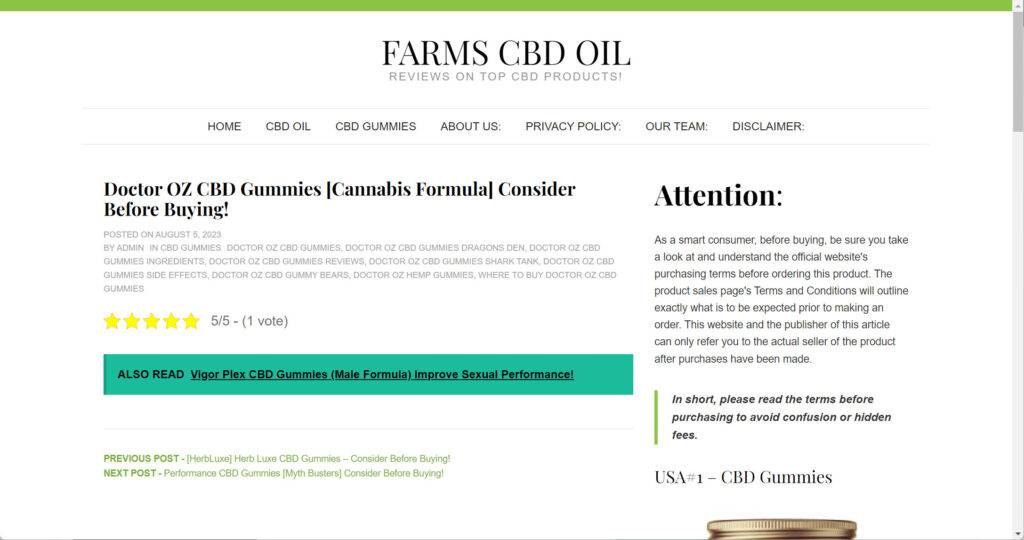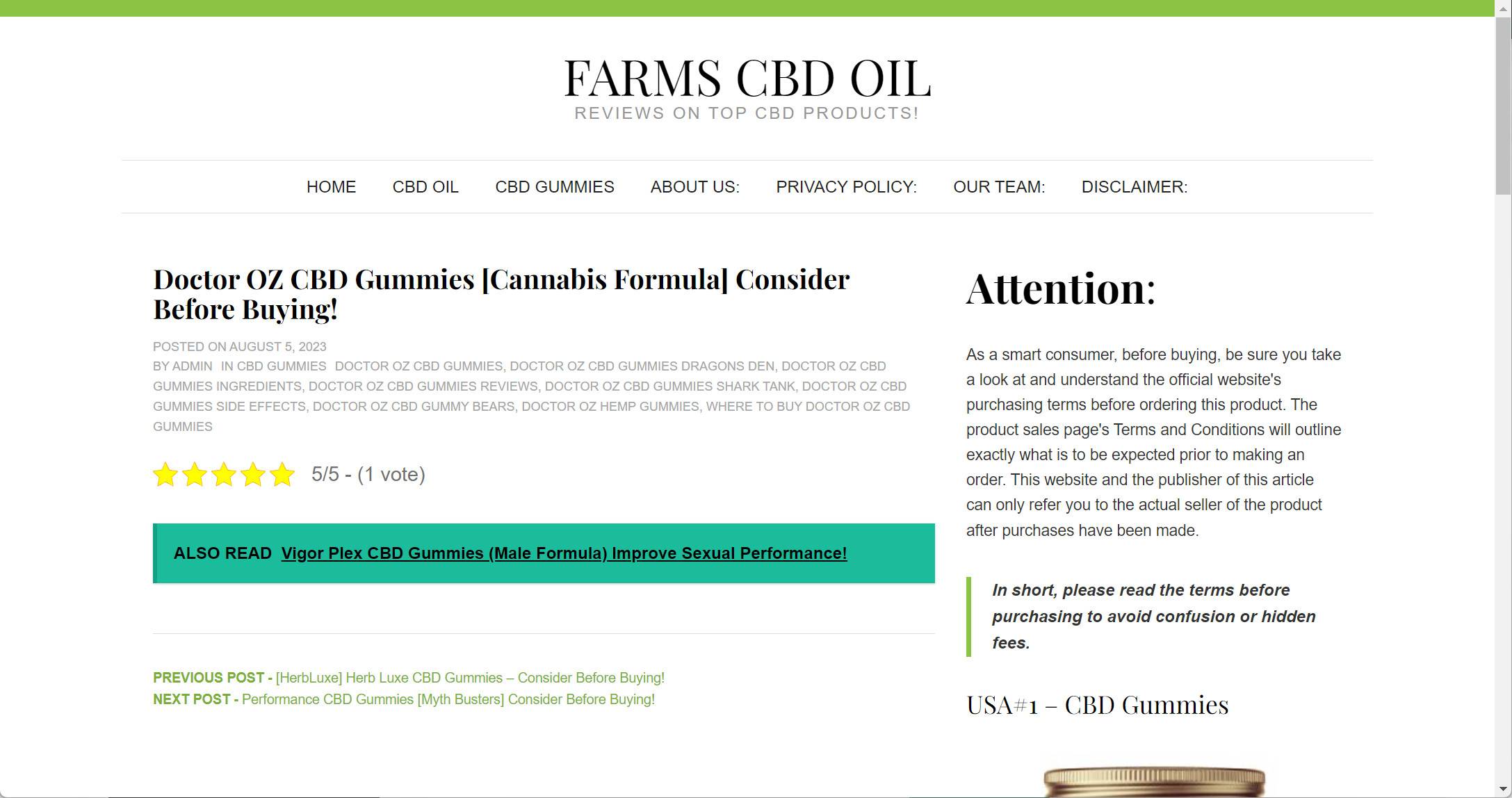A dangerous new CBD scam is using Dr. Oz’s name and image without authorization to deceitfully promote CBD gummies. Scammers are fabricating fake endorsements to falsely imply Dr. Oz’s support in order to trick consumers. Bogus videos and magazine covers aim to mislead people into believing Dr. Oz has validated “Dr. Oz CBD Gummies” as proven to treat pain, anxiety, sleep issues, and more.
In reality, Dr. Oz has never endorsed or approved any CBD gummy products, including this one wrongfully exploiting his reputation. The scammers are trying to capitalize on Dr. Oz’s celebrity status to sell untested gummies through deception. This article will uncover the misleading marketing tactics being used to promote these gummies by falsely associating with Dr. Oz’s name and image without his permission.

Scam Overview
As CBD gummies have surged in popularity for purported benefits like pain relief and reduced anxiety, unscrupulous scammers have seized the opportunity to promote “Dr. Oz CBD Gummies” using fabricated ties to celebrity doctor Mehmet Oz.
These scammers are falsely claiming Dr. Oz has endorsed this specific CBD gummy product and its extensive health benefits. The elaborate scam features doctored videos and images edited to make it appear as if Dr. Oz directly approves these gummies and recommends them to viewers. Fake magazine covers also portray Dr. Oz CBD Gummies as a “miracle” product supported by the doctor.
In reality, Dr. Oz has never endorsed or partnered with any CBD gummy supplement company, including this one wrongfully using his name, likeness, and reputation to promote their product without his permission. There is absolutely no legitimate evidence proving these specific Dr. Oz branded gummies can deliver the wide-ranging health benefits claimed in the scam’s marketing materials.
The perpetrators are intentionally capitalizing on Dr. Oz’s celebrity status and reputation in the health and wellness space in order to deceive and manipulate uninformed consumers. Their goal is to exploit Dr. Oz’s perceived credibility, trustworthiness, and authority as a doctor to sell untested CBD gummies at inflated prices to customers who would never purchase the product if its origins were accurately disclosed.
This brazen scam works by falsely implying Dr. Oz’s support to build an air of legitimacy and scientific proof around a CBD supplement he is not affiliated with in any way. The scammers are hoping that fabricated associations with his name, show, and image will trick consumers who trust Dr. Oz into overlooking the clear absence of actual evidence backing their specific CBD gummy product and outlandish benefit claims. Avoid being deceived by their egregious use of deception and unauthorized exploitation of a well-known doctor’s reputation
How the Scam Works
The Dr. Oz CBD gummy scam starts with doctored videos and images making it seem like Dr. Oz has endorsed the gummies. Fake talk show interviews show Dr. Oz discussing the benefits of taking Dr. Oz CBD Gummies. Quotes are spliced together and taken out of context.
Other deceitful strategies include:
- Fake magazine covers featuring Dr. Oz next to text reading “CBD Miracle!” and “Dr. Oz’s #1 Pick for Pain Relief & Anxiety Aid” implying his endorsement.
- False claims the gummies were featured on The Dr. Oz Show with glowing reviews and approval from Dr. Oz himself.
- Doctored videos impersonating medical experts explaining how Dr. Oz CBD Gummies provide superior CBD absorption and maximum pain relief.
- Fake customer testimonials and reviews raving about improvements in chronic pain, anxiety, sleep, and more from taking the gummies.
- Claims the gummies are “doctor-approved” and contain the highest quality CBD for guaranteed results.
- Limited time discount offers and low stock warnings to create false scarcity and urgency.
- Refusal to provide refunds and difficult cancellation process for orders.
This barrage of falsified evidence aims to trick customers into believing Dr. Oz CBD Gummies are clinically-backed and personally recommended by Dr. Oz himself. But in reality, all the claims about his endorsement are completely fabricated without his permission.
Recognizing the Red Flags
Here are clear signs a Dr. Oz CBD promotion is a total scam:
- The website seems hastily thrown together, unprofessional, and filled with typos/errors.
- The claims of endorsement by Dr. Oz seem questionable and cannot be verified through any objective sources.
- No proof of independent lab testing for purity, dosages, or label accuracy.
- Aggressive sales tactics insist you must purchase now before something expires or sells out.
- No genuine customer reviews, only suspicious glowing testimonials.
- The use of Dr. Oz’s name/image without consent to sell CBD gummies he never endorsed.
Double check any claims of celebrity endorsements for CBD products before believing them. And remember, no CBD gummies are proven to cure all health conditions – responsible dosing is still key.
What to Do If You Are Scammed
If you placed an order and provided payment information, take prompt action:
Contact your credit card company immediately. Ask them to reverse the charges as unauthorized due to the fake Dr. Oz endorsements used in the egregious marketing.
Dispute the charges. If charges go through, quickly dispute them with your card issuer as fraudulent. Provide details on how the false Dr. Oz claims misled you.
Request a chargeback. If disputes are rejected, ask for a chargeback reversal on the grounds that the gummies vastly differ from the marketed product.
Cancel recurring orders. Immediately reach out to the merchant to cancel and halt any future recurring charges tied to your account and credit card.
Mark emails as spam. Doing so will prevent future scam emails about Dr. Oz CBD Gummies from reaching your inbox based on your purchase history.
File complaints. Submit reports to the FTC and your state attorney general detailing the deceitful marketing practices and fake Dr. Oz endorsements.
Leave reviews. Post negative reviews about being scammed on retailer sites to spread awareness and prevent other victims.
Dr. Oz CBD Gummies Scam FAQs
Has Dr. Oz really endorsed these gummies?
No. The claims that Dr. Oz has endorsed Dr. Oz CBD Gummies are completely fabricated. Dr. Oz has not promoted or approved these or any other CBD gummy products. The scammers falsely associate with his name and image without permission.
Can the gummies provide extensive health benefits?
There is no verifiable evidence proving these specific Dr. Oz CBD gummies can treat chronic pain, anxiety, sleep disorders, or other health conditions claimed in the scam’s marketing. Responsible CBD use requires proper dosing and lifestyle factors.
Have the gummies been featured on The Dr. Oz Show?
No. Scammers falsely claim the gummies were featured on The Dr. Oz Show and endorsed by Dr. Oz himself. But these statements are outright lies intended to deceive consumers by exploiting Dr. Oz’s reputation.
Are the gummies FDA approved?
No. The FDA does not evaluate or approve supplements like CBD gummies. Scammers falsely suggest FDA approval or use Dr. Oz’s image to seem legitimate. But legitimate CBD brands undergo independent third-party quality testing that these gummies likely lack.
Can I get a refund if unhappy with the gummies?
You’ll likely have great difficulty getting a refund, by design. Scammers make refunds hard or impossible to obtain in order to avoid complaints. But you can dispute the charges as fraudulent since the gummies are not the product marketed using the fake Dr. Oz endorsements and claims.
Avoid the Dr. Oz CBD Gummy Scam
The Dr. Oz CBD gummy scam exploits the famous doctor’s reputation through unauthorized associations and falsified endorsements. There is no proof Dr. Oz actually supports these specific gummies. Take the time to fact check questionable claims linking CBD products to celebrity endorsements. CBD still requires responsible use for wellness effects. Make informed purchasing decisions for your health and to avoid potential scams.



